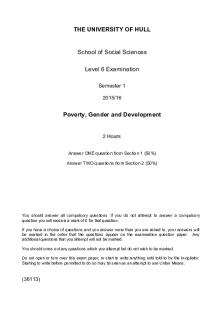Exam 2016, questions PDF

| Title | Exam 2016, questions |
|---|---|
| Course | Japanese Politics |
| Institution | The Chancellor, Masters, and Scholars of the University of Cambridge |
| Pages | 2 |
| File Size | 63.9 KB |
| File Type | |
| Total Downloads | 38 |
| Total Views | 128 |
Summary
Download Exam 2016, questions PDF
Description
AET1 Asian and Middle Eastern Studies Tripos, Part IB Friday 27 May 2016 09.00 to 12.00
Paper J10 Japanese politics Answer three questions. All questions carry equal marks. Write your number not your name on the cover sheet of each answer booklet.
STATIONERY REQUIREMENTS 20 page answer booklet Rough Work Pad
SPECIAL REQUIREMENTS TO BE SUPPLIED FOR THIS EXAMINATION None
You may not start to read the questions printed on the subsequent pages of this question paper until instructed to do so.
Page 1 of 2 AET1/J10/Japanese politics/1/v1
1. ‘The “Reverse Course” was a betrayal of the ideals of the early Occupation.’ Discuss. 2. To what extent has geopolitics constrained Korea’s political evolution? 3. To what extent is the failure of Japan’s opposition parties a function of structure and institutions rather than ideology? 4. How convincing was Chalmers Johnson’s ‘plan rational developmental state’ thesis and why was it so influential in the 1980s? 5. ‘Personalities, rather than parties, are the key factors shaping political change in postwar South Korean politics.’ Discuss. 6. Is Prime Minister Abe a ‘pragmatist’ or an ‘ideologue’ and how different is he from his post-war predecessors? 7. ‘The contemporary political controversy over basing-rights in Okinawa demonstrates that Japanese politics is fundamentally elitist and centralist, rather than pluralist and local in character.’ Discuss. 8. Why has Constitutional reform proven so elusive in post-war Japan? 9. To what degree does scholarly analysis of North Korea prove or disprove the notion that the Democratic People’s Republic of Korea (DPRK) is a ‘rogue state’? 10. Both Japan and the Republic of Korea are common allies of the United States, and yet appear incapable of acting constructively together. Why is this the case, and what is needed to improve interallied cooperation?
END OF PAPER Page 2 of 2 AET1/J10/Japanese politics/2/v1...
Similar Free PDFs

Exam 2015 - 2016, questions
- 6 Pages

Exam January 2016, questions
- 4 Pages

Exam 2016, questions
- 18 Pages

Exam 2016, questions
- 6 Pages

Exam 2016, questions
- 29 Pages

Exam 2013-2016, questions
- 24 Pages

Exam 2016, questions
- 2 Pages

Exam June 2016, questions
- 7 Pages

Exam 2016, questions
- 6 Pages

Exam 2016, questions
- 2 Pages

Exam 2016, questions
- 9 Pages

Exam 2 2016, questions
- 6 Pages

Exam May 2016, questions
- 6 Pages

Exam October 2016, questions
- 26 Pages

Exam 2016, questions
- 2 Pages

Exam 2016, questions
- 3 Pages
Popular Institutions
- Tinajero National High School - Annex
- Politeknik Caltex Riau
- Yokohama City University
- SGT University
- University of Al-Qadisiyah
- Divine Word College of Vigan
- Techniek College Rotterdam
- Universidade de Santiago
- Universiti Teknologi MARA Cawangan Johor Kampus Pasir Gudang
- Poltekkes Kemenkes Yogyakarta
- Baguio City National High School
- Colegio san marcos
- preparatoria uno
- Centro de Bachillerato Tecnológico Industrial y de Servicios No. 107
- Dalian Maritime University
- Quang Trung Secondary School
- Colegio Tecnológico en Informática
- Corporación Regional de Educación Superior
- Grupo CEDVA
- Dar Al Uloom University
- Centro de Estudios Preuniversitarios de la Universidad Nacional de Ingeniería
- 上智大学
- Aakash International School, Nuna Majara
- San Felipe Neri Catholic School
- Kang Chiao International School - New Taipei City
- Misamis Occidental National High School
- Institución Educativa Escuela Normal Juan Ladrilleros
- Kolehiyo ng Pantukan
- Batanes State College
- Instituto Continental
- Sekolah Menengah Kejuruan Kesehatan Kaltara (Tarakan)
- Colegio de La Inmaculada Concepcion - Cebu